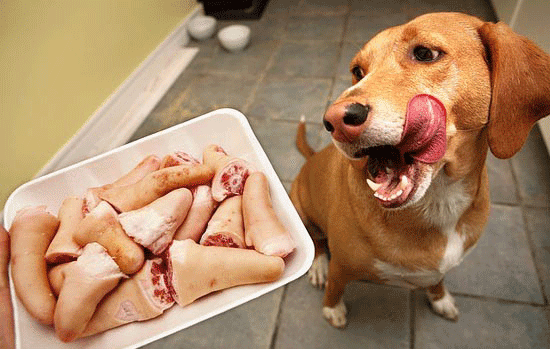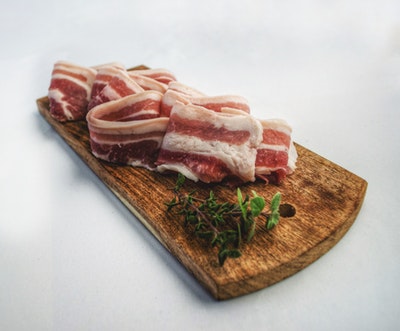Can Dogs Eat Pork? Is Pork Good Or Bad For Dogs?
 |
| Can Dogs Eat Pork? Is Pork Safe For Dogs? |
The questions dogs can eat pork, and is pork bad for dogs, are two that are very frequently asked.
After all, it can be difficult to know which human foods are safe for your dog. Before giving your dog pork products, it is best to check what is allowed and what is not. Take a look at this handy guide to learn more about pork products that your dog can and cannot eat.
Can Dogs Eat Pork Bones?
The short answer to this question is no. Pork and poultry bones (cooked and uncooked) are the two most dangerous bones you can give to a dog.
Indeed, they are incredibly easy to split into pieces, which then presents a risk of suffocation for your dog. Cooked bones of any kind are also dangerous for this reason.
Shards, in addition to the risk of suffocation, can also damage your dog's mouth, throat or intestines if they pass without the dog choking. This can result in the need for immediate surgery or even death.
Even small pieces that you don't really notice can cause blockages and lacerations, which is why dogs should always be watched when they chew them.
Veterinarians strongly recommend giving dogs raw bones (which are NOT pork or poultry) after eating.
After ten minutes, you must then remove the bone and place it in the refrigerator overnight. After four days, the bone must be removed. A bone must also be larger than the length of a dog's muzzle to prevent it from being swallowed whole.
Of course, bones are a great way for your dog to prevent plaque buildup on his teeth and prevent gum disease.
It also relieves boredom and keeps them from chewing their paws. Remember to keep it safe and that raw bones are not only dangerous, but they also eliminate the nutrients your dog would need.
Can Dogs Eat Pork? Is Pork Safe For Dogs?
Read More: Can Dogs Eat Salmon?
Why Can't Dogs Eat Pork?
Pork is a touchy subject as there are many divides when it comes to deciding whether dogs can eat it or not.
Some say yes, others say no. Veterinarians and owners have their own opinions, so making your own choices can be a bit tricky. However, at the end of the day, you must do what you think is best for your dog.
You will find that there are a large number of dog foods that contain pork, and therefore the negativity about it can get a little confusing.
Some people think pork is a very processed meat, leaving it high in fat and salt when it is finally ready for consumption - even for dogs. Others believe there is a chance that parasites have infected the meat, which could then be passed on to your dog.
However, it is not recommended to feed your dog with treats like pig ears and rawhides. In addition to being high in fat, they are also processed using fairly horrible chemicals that are not even fit for human consumption.
This carries a high risk of illness for your dog, so beware when you go for these processed treats.
So it's not really about not being able to eat pork, but rather the type of Pork you give them.
In the next two sections, we take a look at cooked and uncooked pork - helping you determine the risks and benefits that accompany each. Hopefully, this will provide you with the information you need to make an informed choice about your dog's diet.
Read More: Can Dogs Eat Turkey?
Can Dogs Eat Cooked Pork?
 |
| Can Dogs Eat Pork? Is Pork Safe For Dogs? |
The short answer here is yes; dogs can eat cooked pork. However, you also need to be careful about the type of pork product you give them.
For example, a delicious snack or pork chop on the dinner table is unlikely to hurt as long as you give them meat. However, bacon is another story.
Bacon is high in salt and fat, two things that can cause pancreatitis in dogs. Too much salt can also cause excessive thirst and urination, a condition that can cause a dog to drink too much and to bloat, which can lead to death.
Even if your dog is sitting and begging most adorably, don't give him bacon for his health.
The same goes for giving them fatty pork rinds. The high concentration of fats (and sometimes salt) can lead to serious health problems that can lead to their death.
Of course, this can also depend on the size of a dog. The smaller the dog, the less it takes to get sick. Likewise, a larger dog needs more to get sick due to overconsumption.
However, it is best not to risk it and, on the contrary, avoid giving your dog pork products high in salt and fat. A little meat, freshly prepared and ready to eat, is good, but avoid fatty peels and bacon products.
Can Dogs Eat Raw Pork?
Again, the short answer to this question is yes. It is considered safe for dogs to eat raw pork.
In general, it is considered to be as harmless to them as when they eat raw beef or poultry.
Wolves and wild dogs usually eat a lot of raw meat in their diet, so it's not a question of whether or not they can digest the meat in the first place. However, there is one thing to watch out for.
Trichinosis is the thing that most veterinarians and pet owners will warn you about before deciding to feed your pet any form of raw pork.
It is a disease caused by a species of roundworm known as Trichinella. You can find these parasitic worms in animals that eat meat as part of their diet, which includes pigs, wild boars, and bears.
Humans and dogs can contract trichinosis by eating raw or undercooked pork products (or the product of any other meat-eating animal) that have been infected with Trichinella larvae. The symptoms of trichinosis are:
1. Upset stomach and vomiting
2. Cramps
3. Nausea
4. Fever
5. Weakness
6 Muscle pain
7. Inability to chew
8. Seizures
9. Cardiac arrest
10. Respiratory problems
Read More: Can Dogs Eat Raw Meat?
Is It Safe For Dogs To Eat Pork?
 |
| Can Dogs Eat Pork? Is Pork Safe For Dogs? |
While this is an area that some owners may debate, the answer is a little more complex than a simple yes or no. It is safe to eat pork, but certain conditions must be met if you plan to feed your dog with "other white meats". Regular pork is safe for dogs, as long as you keep it simple and away from the bells and whistles that people tend to cook with. Add-ons, such as seasonings and friction spices that contain the following, are extremely dangerous because they are very toxic if swallowed:
1. Onion powder
2. Nutmeg
3. Garlic powder
If you like to use condiments such as BBQ sauce, be aware that it is not recommended for dogs and should be avoided. Many sauces are rich in salt and sugar and contain added flavors, such as garlic and onion. If your dog eats a piece of pork covered with barbecue sauce, watch for any unusual symptoms that may occur and if they develop a reaction, contact your veterinarian immediately.
Can I Feed My Dog With Raw Pork?
 |
| Can Dogs Eat Pork? Is Pork Safe For Dogs? |
Eating raw or undercooked pork is not safe for dogs or humans, due to the larvae of the trichinella spiraling parasites, which can cause the parasitic infection known as trichinosis. An infection transmitted by pork, it can occur when a dog eats the muscles of animals infected with the trichinella parasites. This affects humans more commonly than dogs. Trichinella spiralis infection will only produce subtle symptoms in dogs:
1. Stomach ache
2. Vomiting
3. Diarrhea
4. High fever
5. Lethargy
6. Muscle inflammation
7. Pain and stiffness
Not all of these symptoms are present in dogs; generally, pets with weaker immune systems have more severe symptoms.
How Much Pork Can A Dog Eat?
Like any other food you try for the first time, feed your dog a small amount to see if there is a reaction. Certain meats are more likely to cause allergic reactions, including pork, rabbit, and lamb.
Pork is also rich in a type of fat that is difficult for dogs to digest, which can lead to indigestion and inflammation of the pancreas.
Can Dogs Be Allergic To Pork?
A pig allergy is possible in dogs. For this reason, give your pet a small amount the first time he tries it. Make sure he doesn't have a reaction before giving it back to him. While it may be tempting to assume that your dog will be fine with pork, it is actually one of the most common meat allergies with lamb and rabbit.
Can I Give Pork Bones To My Dog?
 |
| Can Dogs Eat Pork? Is Pork Safe For Dogs? |
While it may be tempting to throw away leftover bones after dinner, think twice before doing so. Even though dogs love to chew, it's not 100% safe. Once cooked, the bone dries out, making it brittle and brittle. When gnawed, it can break into sharp pieces, damaging the esophagus and internal organs, which can also cause choking. And although uncooked bones are less likely to break, it's still possible. If your dog has a good bone, consider a high-quality edible dental bone as an alternative.
Is preserved pork, like ham and bacon, safe for my dog to eat?
The answer to these two types of meat is no! In 2015, the World Health Organization found that processed meats such as bacon and sausages were known carcinogens linked to cancer. Bacon is an incredibly rich and fatty food with a high salt content, which may be too much for a dog's stomach. Eating a large amount can cause pancreatitis, which can be fatal.
Ham also has a dangerously high salt content, which can cause increased thirst which could lead to a life-threatening condition called "bloating". Bloating occurs when a dog's stomach fills with gas, food, or liquid, causing it to expand. Due to the high salt content in the ham, dogs become dehydrated and drink an excessive amount of water. The pressure is exerted on other organs, which can potentially be life-threatening. Even though pork, ham, and bacon come from the meat of the same animal, there are clear differences to take into account.
What Is An Alternative Meat To Feed My Dog?
Chicken is an additional source of protein to add to your dog's diet. It is easy to digest and packed with vitamins, minerals, fats, and essential amino acids. Veterinarians recommend feeding your dog plain, unseasoned boiled chicken when he has gastrointestinal issues.

Comments
Post a Comment